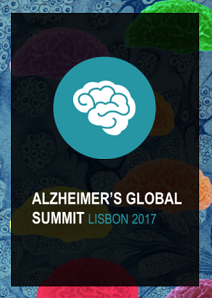 Volver al principio de la página
Volver al principio de la página
Tipo:
Catalogación:
- Videoteca
- Videoteca, Conferencias
Autor:
Mercé Boada
Idioma:
Fecha de Publicación:
Editorial:
Global Summit Alzheimer
Descriptores:
- Demencias
Resumen:
Vídeo de la conferencia de la Dra. Mercé Boada (Fundación ACE), titulada «The Art of (NO) Lose», que tuvo lugar en las instalaciones de la Fundación Champalimaud durante el Global Summit Alzheimer's Research & Care Lisbon 2017.
El objetivo de esta ponencia es conocer la situación y expectativas específicas en cuanto a la predicción y prevención de la enfermedad de Alzheimer, así como las futuras vías que proponen una mejora de la calidad de vida de las personas que la padecen.
Abstract:
The clinical evolution of Alzheimer’s disease (AD) is well-founded in a subtle and progressive loss of cognitive functions, in which the memory chairs the symptomatic courtship. Even today the AD can be defined as a losing process, from the benign forgetfulness himself I. The art of losing isn’t a hard of master. The art of (NO) losing is a hard of master.
Global Alzheimer’s disease (AD) research is at a critical time. The global society is increasingly aware of the frightening rate of growth of the human and financial burden caused by this condition, and of the urgent need to halt its progression. In the wake of this increased sense of urgency, society is calling for increased action and governments worldwide are responding by recognizing dementia as a public health priority and increase funding and define strategies to defeat AD.
Today, a rapidly growing number of individuals with mild cognitive impairment (MCI) specifically ask for biomarker-based prediction of AD. Consequently the scientific community holds great responsibility to quickly put in place and optimize the machinery necessary for testing new treatments or interventions. In clinical practice, specialist increasingly offers predictive diagnosis to patients. However, the expectations and attitudes of patients and their caregivers are yet widely unknown.
For its success, it is necessary that researchers establishing contact understand the culture of the community and maintain direct and stable contact. The concept of community based participatory research (CBPR) defines a structured and bidirectional methodology of community outreach that endeavors to reduce the distance between researchers and a community by establishing a forum of mutual communication and learning. Investigators inform of research results with the objective of causing a positive impact in the health of the community and so its members understand the importance of scientific research and the principles it is based on.
Social, clinic and basic research in AD is moving forward to detect hidden individuals at the earliest stages of the disease and, why not, look for volunteers asymptomatic individuals to understand cause and consequences of this complex polyhedral process and to stablish a definitely the new status of the art of no losing.
The aim of this update is to learn about the specific attitudes and expectations towards prediction and prevention AD as well as future new topics for improve their quality of life.
Observaciones:
Vídeo de la conferencia




















